Greetings to all! I am excited to introduce myself as @mituu, Dhaka, from the beautiful country of Bangladesh.

The emergence of Blockchain Technology has brought about a significant shift in how we conduct transactions and communications. I am thrilled to participate in the #SteemitCryptoAcademy contest, which provides a unique opportunity to learn more about this revolutionary technology.
Blockchain Technology offers an innovative solution in a world where the need for security and transparency is paramount. As a passionate learner, I am eager to delve deeper into the intricacies of this technology and explore its vast potential. I am grateful to the organizers of this contest for creating a platform for us to expand our knowledge and share our experiences. I look forward to participating in this fantastic community and contributing to its growth. Thank you for this excellent opportunity.
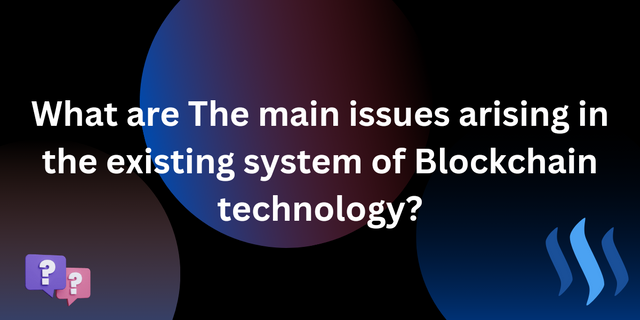
Blockchain technology has gained much attention recently due to its potential for transforming various industries. However, as with any new technology, issues must be addressed in the existing blockchain technology system.
One of the main issues is scalability. As blockchain technology is decentralized, every node on the network has to store a copy of the entire Blockchain. This results in significant data storage and processing power requirements, which can make the system slower and less efficient as the number of users and transactions increases.
Another significant issue is security. Blockchain technology is designed to be secure, but there have been a instances of hacking and theft of cryptocurrency. In addition, the decentralized nature of a Blockchain makes it challenging to change or modify transactions once they are recorded. Still, it also means that any security vulnerabilities could affect the entire network.
Interoperability is another critical issue with the current blockchain system. As there are multiple blockchain platforms and protocols, it can be challenging to transfer data and value between them. This can lead to fragmentation in the blockchain ecosystem, hindering the potential benefits of a unified and interoperable system.
Furthermore, the lack of regulation and standardization in the blockchain industry has resulted in a lack of clarity for businesses and consumers alike. This can lead to uncertainty around legal and compliance requirements, making it difficult for companies to adopt blockchain technology in a regulated environment.
Another significant issue is the energy consumption required for blockchain transactions. The proof-of-work consensus algorithm used by many blockchain systems requires a significant amount of energy, leading to concerns about environmental impact of blockchain technology.
Lastly, the issue of governance in blockchain technology is an ongoing challenge. As the technology is decentralized, no central authority oversees and regulates the system. This can be a lead to conflicts of interest and disagreements among stakeholders, making it challenging to make changes and improve the system as a whole.
While blockchain technology holds great promise, several issues must be addressed to realize its potential fully. These include scalability, security, interoperability, regulation, energy consumption, and governance. As the industry continues evolve, it is crucial to find solutions to these issues to ensure the long-term success of blockchain technology.
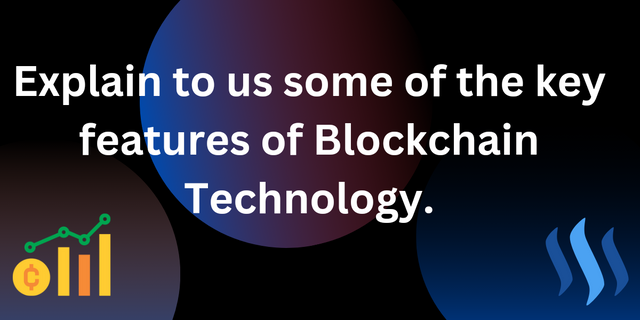
The Blockchain technology is a revolutionary concept that has gained widespread recognition for its a ability to provide a secure and transparent means of conducting transactions. There are some of the key features of blockchain technology include the following:
Decentralization: One of the most important features of blockchain technology is that it operates in a decentralized manner. It does not rely on a central authority or intermediary to verify transactions. Instead, the technology uses a network of nodes to validate transactions, making it more secure and resistant to fraud.
Transparency: Another critical feature of blockchain technology is its transparency. And Once a transaction is recorded on the Blockchain, it cannot be altered or deleted, which makes it easy to track and verify. This makes it an excellent tool for reducing fraud and increasing accountability.
Security: Blockchain technology uses advanced cryptographic techniques to ensure that transactions are secure and tamper-proof. This is is makes it virtually impossible for hackers to break into the system and steal data.
Immutability: The Blockchain is an immutable ledger, and meaning that it cannot be altered or deleted once data is recorded. This ensures that all transactions are permanent and cannot be manipulated or tampered with.
Efficiency: Blockchain technology is highly efficient, as it can process transactions in real time without intermediaries. This makes it an ideal solution for businesses conducting large volumes of transactions quickly and securely.
Smart Contracts: Another essential feature of blockchain technology is the ability to use smart contracts. And Smart contracts are self-executing contracts that automatically enforce the terms of an agreement. This makes it possible to automate complex business processes, reducing the need for intermediaries and increasing efficiency.
Overall, the key features of blockchain technology make it an ideal solution for businesses and organizations that require a secure and transparent means of conducting transactions. As technology evolves, we expect and see many more innovative applications and use cases emerge in the coming years.
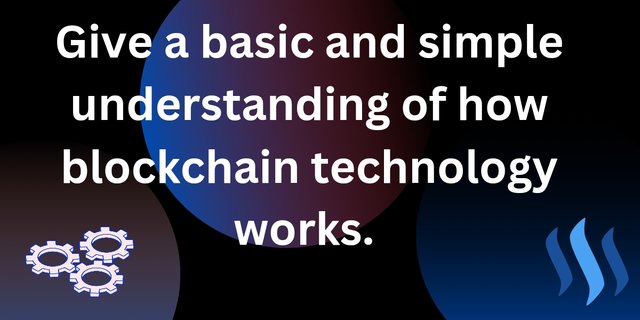
The Blockchain technology is a decentralized system that allows transactions to be recorded and verified without a central authority or intermediary.
In a blockchain network, transactions are bundled into blocks and cryptographically secured. These blocks are then added to a chain of existing blocks, hence the name "blockchain."
Each block in the chain contains a unique code called a "hash" that links it to the previous block, creating a secure and immutable ledger of all the transactions. This means that once the transaction is recorded in the Blockchain, it cannot be altered or deleted.
The blockchain network is maintained by a group of computers called "nodes" that work together to verify and validate transactions. And Each node has a copy of the blockchain ledger, and all nodes work together to ensure the accuracy and security of the ledger.
When a new transaction is initiated, it is broadcasted to the network of nodes. The nodes then work to validate the transaction by ensuring that it meets specific criteria, such as having sufficient funds or meeting the requirements of a smart contract.
And Once the transaction is validated, it is added to a block along with other validated transactions. This block is then broadcasted to the network, and the nodes work to validate the block by solving a complex mathematical puzzle. This process is known as "mining," The node that solves the puzzle first is rewarded with newly created cryptocurrency.
Once the block is validated, it is added to the blockchain ledger and part of the permanent record. This process continues as more transactions are added to the Blockchain, creating a secure and transparent ledger of all the transactions that have taken place.
Blockchain technology provides a secure and transparent way to record and verify transactions without a central authority or intermediary. Its decentralized nature and cryptographic security make it an ideal solution for various industries and applications, from financial transactions to supply chain management.
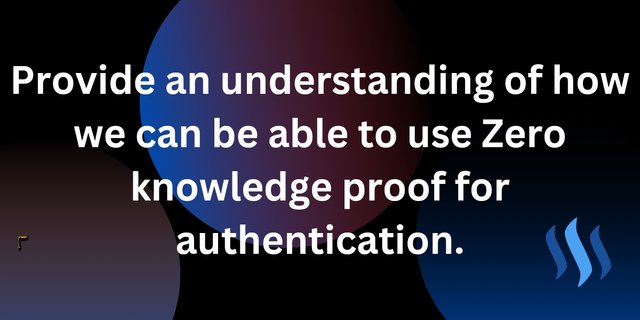
Zero-knowledge proof (ZKP) is a cryptographic concept and that allows one party to prove to another party that they have specific knowledge without revealing it. In other words, ZKP allows users to authenticate their identity or prove that they possess certain information without revealing sensitive details.
To understand how zero-knowledge proof can be used for authentication, it is essential first to understand how it works. ZKP relies on using complex mathematical algorithms to create proofs of knowledge. These algorithms are designed to allow the party making the proof to demonstrate knowledge of a specific piece of information, such as a password or a private key, without revealing the information itself.
For example, let's say that Alice wants to a prove to Bob that she knows the password to her email account. With zero-knowledge proof, Alice could generate proof of knowledge demonstrating that she knows the correct password without revealing the password itself. Bob can then verify the proof without ever seeing the password, ensuring that Alice is the rightful owner of the email account.
This type of authentication is beneficial in situations where privacy and security are of utmost importance. For instance, zero-knowledge proof can be used in online banking applications to allow customers to prove their identity without revealing personal information. Similarly, it can be used in online voting systems to allow voters to verify that their vote was counted without revealing who they voted for.
Several types of zero-knowledge proof protocols can be used for authentication, each with unique advantages and disadvantages. Some famous examples include zk-SNARKS, Bulletproofs, and STARKs. These protocols differ in complexity, security guarantees, and computational requirements, and the choice of which protocol to use will depend on the application's specific use case and requirements.
In conclusion, zero-knowledge proof provides a powerful tool for authentication that allows users to prove their identity or knowledge without revealing any sensitive information. Blockchain technology continues to a evolve and become more widely adopted, we will likely see an increasing number of applications that rely on zero-knowledge proof for authentication and privacy.
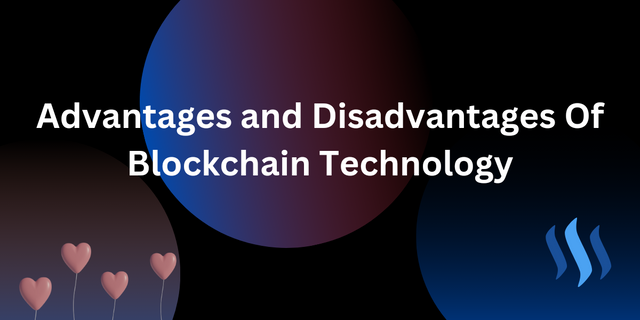
Blockchain technology has garnered much attention recently, with many industries exploring its potential for improving efficiency, security, and transparency. However, while it has numerous advantages, it also has some disadvantages that must be considered. Here are some of the given main advantages and disadvantages of blockchain technology:
Advantages:
Security: One of the most significant advantages of blockchain technology is its security. And Blockchain uses cryptography to secure transactions, making it is a virtually impossible for anyone to alter or tamper with the data stored on the network.
Transparency: Blockchain technology provides transparency in transactions. Abd All participants in a blockchain network have access to the same information, making it difficult for any person or entity to manipulate the data.
Decentralization: Blockchain technology is decentralized, meaning no central authority controls the network. And This eliminates the need for intermediaries, reducing costs and increasing efficiency.
Efficiency: Blockchain technology is designed to be highly efficient. Transactions are processed quickly, and there are no intermediaries to slow down the process.
Reliability: Blockchain technology is highly reliable due to its decentralized nature. There is no central point of failure, meaning that even if one node fails, the rest of the network can continue to operate.
Disadvantages:
Complexity: Blockchain technology is complex, making it difficult to understand how it works. This can lead to mistakes and errors that can compromise the security and reliability of the network.
Scalability: Blockchain technology still needs to be scalable enough to handle large volumes of transactions. This can lead to faster processing times and higher costs.
Energy consumption: Blockchain technology requires significant amount of energy to operate. This is due to the high computational power needed to process transactions and maintain the network.
Lack of regulation: The lack of regulation in the blockchain industry can be both an advantage and a disadvantage. While it allows for innovation and experimentation, it also creates a lack of accountability and can make it difficult to enforce laws and regulations.
Data privacy: While blockchain technology provides transparency, it also raises concerns about data privacy. All transactions on the network are public, meaning that sensitive information could be exposed.
Overall, blockchain technology has many advantages and is being explored for its potential to revolutionize industries such as finance, supply chain management, and healthcare. However, it is essential to consider its disadvantages and work to address them to ensure that blockchain technology can be used safely and effectively.
Conclusion
In conclusion, blockchain technology has revolutionized how we perceive and conduct transactions. Its decentralized nature, immutability, and security features have made it a viable option for various industries such as a finance, healthcare, and supply chain management.
One of the significant advantages of a blockchain technology is that it eliminates the need for intermediaries in transactions, reducing costs and increasing efficiency. Additionally, the transparency and accountability of the technology make it ideal for preventing fraud and corruption.
However, blockchain technology also has some drawbacks. Its complex nature and the need for significant computing power make it difficult for small businesses or individuals to adopt. The technology's reliance on consensus algorithms can also slow transaction processing times, limiting its scalability.
Despite these challenges, the potential applications of blockchain technology are vast, and we can expect to see more adoption in the future. Furthermore, with ongoing developments and advancements, we can hope to see solutions to some of the limitations of the technology, making it more accessible and user-friendly.
In summary, blockchain technology is a disruptive innovation with significant potential. Its advantages include decentralization, security, transparency, and efficiency, while its disadvantages include complexity, scalability, and limited accessibility. Blockchain technology will continue transforming how we conduct transactions and manage data.
I would like to invite my friends to share there own thought in this contest: @ripon0630, @ternuritajessi, @shohana1, @simonnwigwe, @chiabertrand, @nevlu123, and @harferri @allan.fakeer @cryptobitcoins @hmorillo2021 @mrsokal @goodness2 @enamul17 @ikmalhariamuna
Thank you so much for reading my article! And don't forget engaging with our fellow Steemian. Have a good day everyone.
Noted: all photos are created by CANVA
Assalamualaikum,
Great effort, Your post is informative and helping for knowing about the concepts of
Blockchain.
Proof of Work require a lot of energy to run system so the miners can validate the transactions and can add blocks to Blockchain. This is great threat foe energy management and Blockchain is getting heated comment just because of large use age of energy.
ZKP is a great Application of Blockchain technology which help us to make contracts and deals with other users by confirming thier authenticity without getting access to his privacy.
Your explanation about working of Blockchain is good and easily understandable. You deserve good marks and professor provide you. I hope you will end up this contest with good results.
If you find time please read my entry of this challenge so i can get your views about my post. Good luck my friend 😊
Regards: @cryptobitcoins
Downvoting a post can decrease pending rewards and make it less visible. Common reasons:
Submit
Thank you so much for your response ❣️
Downvoting a post can decrease pending rewards and make it less visible. Common reasons:
Submit
I think the leaders of our diverse countries should adopt the transparency of the blockchain In other to get a very smooth running country
Downvoting a post can decrease pending rewards and make it less visible. Common reasons:
Submit
The transparency and accountability offered by blockchain technology can certainly help to address issues of corruption and improve the efficiency of government operations. It's exciting to think about the potential impact that blockchain could have on the future of governance.
Downvoting a post can decrease pending rewards and make it less visible. Common reasons:
Submit